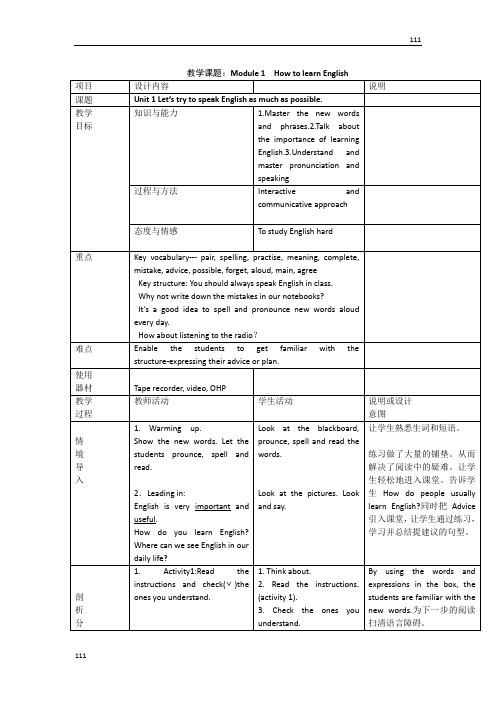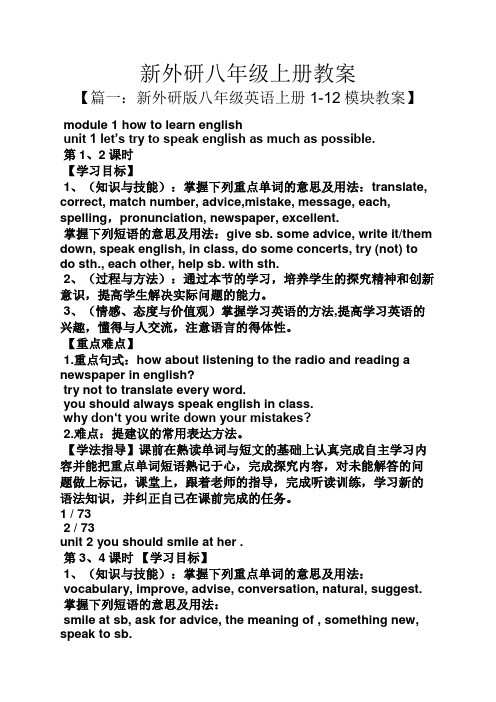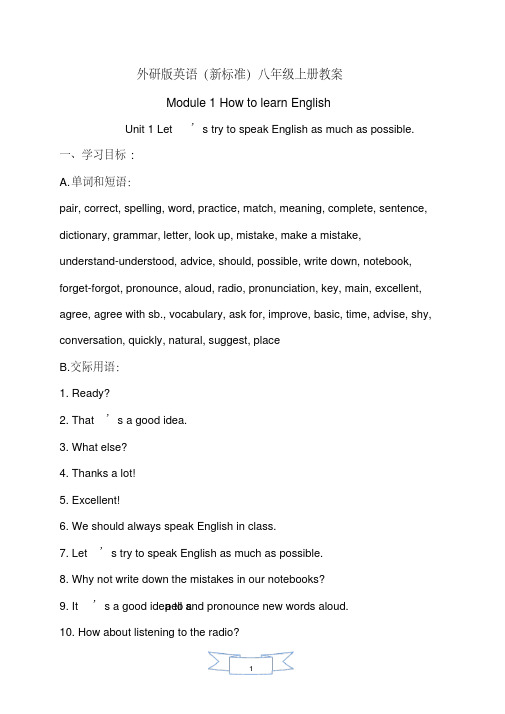外研版八年级英语上册优质教案全册合集
外研版英语八年级上册教案 全册教案

1. Think about. 2. Read the instructions. (activity 1). 3. Check the ones you understand.
说明或设计 意图 让学生熟悉生词和短语。
练习做了大量的铺垫。从而 解决了阅读中的疑难。让学 生轻松地进入课堂。告诉学 生 How do people usually learn English?同时把 Advice 引入课堂,让学生通过练习, 学习并总结提建议的句型。
1. Read the words and phrases. 2. Listen and answer the questions. (Part 2). 1. Make sentences to practice the sentence structure. And then discuss what the sentence structure is like.要学生找出 Part3 中 提出建议的句型。 2. Listen to Part 3 and complete Part 4 then practice reading the dialogue in groups. Then several should be asked to read in public. At last ask some groups to act out part3. 1. Read the dialogue together with the tape recorder. Then read the sentences of Part 5, with the tape recorder. 2. Read the sentences to let the partner check if the sentences are pronounced in a correct way. Talk about problems in learning English and give advice. Students read, write and remember.
外研版初中英语八年级上Module 1-Module 12全册全套精品教案设计附教学资源

外研版英语八年级上Module 1 How to learn English全模块教案II. Teaching material analyzing 教材分析本模块以“How to learn English”为话题,以学习征求建议、提出建议的方法为主线,介绍了单词分类记忆、根据上下文判断词义;听力细节辨认、反向推理;略读等学习方法。
通过模块学习,学生除了能掌握上述英语学习方法之外,还可以根据同学的建议制定更适合自己的学习计划;同时,模块也复习了一般现在时、现在进行时、一般过去时、一般将来时的用法。
Unit 1 通过听、读、说训练,初步学习给别人提建议的方法。
其中活动1要求将所给表示学习活动的词汇分类;活动2要求根据录音判断对话主题;活动3—5听读包含建议的对话并完成填表、答问等任务。
活动6学习英语中的连读法;活动7根据提示口头练习给别人提建议的方法。
Unit 2 通过读、写训练,学会向别人征求建议或给别人提出建议。
其中活动1要求学生列举自己在语言学习活动中遇到的实际困难。
活动2—4要求学生阅读一语言学习网站“问答专栏”中内容后完成补全句子、回答问题等练习。
活动5—6要求学生根据自己的学习实际,完成一封求助信并征求同学的建议。
Unit 3 对“提供学习建议”的功能项目进行综合训练,并在此基础上完成制定学习计划的任务。
其中活动1、2 要求听取Charlie和Mary的对话,选出所听到的表示建议的句式并完成问答练习。
活动3—5 要求根据所供图片,描述、评论Jack的学习、生活情况,并根据提示问题提出建议。
活动6要求阅读Helen的问题并用所供表达完成Simon的回信。
活动7—9是词汇的拓展训练:其中7要求根据图片写出单词;8用所供词汇组成短语;9用所供词汇完成句子。
Around the world给学生介绍了通过多种渠道学习英语的方法。
Module task 要求学生反思自己的英语学习,通过图标明晰信息,并根据图标信息制定学习计划;然后小组交流,提出修改建议。
最新外研版英语八年级上册全册教案

Module 1 How to learn EnglishUnit 1 Let’s try to speak English as much as possible.一、学习目标:A.单词和短语:pair, correct, spelling, word, practice, match, meaning, complete, sentence, dictionary, grammar, letter, look up, mistake, make a mistake, understand-understood, advice, should, possible, write down, notebook, forget-forgot, pronounce, aloud, radio, pronunciation, key, main, excellent, agree, agree with sb., vocabulary, ask for, improve, basic, time, advise, shy, conversation, quickly, natural, suggest, placeB.交际用语:1. Ready?2. That’s a good idea.3. What else?4. Thanks a lot!5. Excellent!6. We should always speak English in class.7. Let’s try to speak English as much as possible.8. Why not write down the mistakes in our notebooks?9. It’s a good idea to s pell and pronounce new words aloud.10. How about listening to the radio?11. It’s better not to translate.12. It’s a good idea to check new words every day.二. 教学目标1. Function: Giving suggestions (English study)2. Structure: Giving advice: 1) We/You sh ould…2) Let’s try to…3) Why not…?4) It’s a good idea to…5) How about…?6) Why don’t we/you…?7) It’s better not to…3. Skills: 1) Listening and understanding familiar topics (English study).2) Talking about problems in English study and giving advice, conductingconversations in several turns.3) Reading and finding specific information about English study.4) Drafting a letter asking for advice about English study, revising throughpair discussion..4. Around the world: English online5. Task: Writing your English study plan.三、重点及难点:Giving advice: 1) We/You should…2) Let’s try to…3) Why not…? 4) It’s a good idea to…5) How about…? 6) Why don’t we/you…? 7) It’s better not to…四、教学设计:Unit 1 Let’s try to speak English as much as possible.ⅠTeaching modelListening and speakingⅡTeaching methodPWP approachⅢTeaching aims1. To understand conversations involving advice on learning English.2. To get information about how to learn English from the conversation.3. To understand the way of giving advice.4. To practise giving advice on English learning.ⅣTeaching Objectives1. Key vocabulary: pair, correct, spelling, word, practice, match, meaning, complete,sentence, dictionary, grammar, letter, look up, mistake, make amistake, understand-understood, advice, should, possible, writedown, notebook, forget-forgot, pronounce, aloud, radio, key, main,excellent, agree, agree with sb., vocabulary2. Key structures: 1) We/You should…2) Let’s try to…3) Why not…? 4) It’s a good idea to…5) How about…? 6) Why don’t we/you…? 7) It’s better not to…ⅤTeaching aidsTape recorder, OHP , videoⅥTeaching StepsStep 1 Warming up1. Show some pictures of school things. Say how to learn English well.2. Read the words after the teacher.3. Introduce the new words.4. Learn the new words.Step 2 Read and check.1. Read the instructions in Activity 1and check(√) the ones you understand.1) Work in pairs. Ask and answer the questions.2) Correct the spelling.3) Listen and check the words you hear.4) Practise saying the words.5) Match the words with the meaning.6) Complete the sentences with the words in the box.3. Ask the students to check their answer with a partner.4. Call back the answer from the whole class and check the answer.Step 3 Listen and repeat.1. Ask the students to read the word and expressions in Activity2.dictionary grammar letter look up make a mistake meaning understand 2. Read through the questions.1) Which word did Daming not understand?2) What mistake did Lingling make?3) How does Daming usually check the spelling of a word?4) Why is it difficult for Daming to check the spelling of cinema?3. Play the recording and ask the students to listen to the recording carefully.4. Listen and answer the questions. Use the words and expressions from the box.5. Play the recording again, then they can check their answer with a partner.6. Call back the answer from the whole class and check the answer.Step 4 Listen and read.1. Show some pictures, and ask the students to talk about them.2. Ask the students to read the conversation silently.3. Play the recording and ask the students to listen and read the conversation.4. Read the conversation.5. Act it out.6. Learn “Everyday English”Ready?That’s a good idea.What else?Thanks a lot!Excellent!7. Tell the students how to learn English well.1) We should always speak English in class.2) Let’s try to speak English as much as possible.3) Why not write down the mistakes in our notebooks?4) Don’t forget to write down the correct answers next to the mistakes.5) It’s a good idea to spell and pronounce new words aloud every day.6) How about listening to the radio?7) How about reading English stories?8) W hy don’t we try to find some English pen friends?Step 5 Writing.1. Read the conversation again.2. Ask the students to write notes about learning English.Listening : listen to the radioSpeaking : ___________________________________________________ Reading : ____________________________________________________ Writing: ____________________________________________________Learning new words: ___________________________________________3. Ask the students to check with a partner.4. Check the answers:Keys:Listening : listen to the radioSpeaking : speak English as much as possibleReading : read an English storiesWriting: write to pen friends, write down our mistakes in our notebooks, write down the correct answers next to the mistakesLearning new words: spell and pronounce new words aloud every dayStep 6 Underline the correct words and expressions.1. Ask the students to read through the passage in Activity 4.Here’s my (1) advice / notebook about learning English. Speak English (2) always / as much as possible in class, and listen to English (3) in the newspaper / on the radio. I (4) agree / forget it’s a good idea to look up n ew worlds in the ( 5) notebook / dictionary. You can find the (6) correct / excellent pronunciation and learn the meaning2. Underline the correct words and expressions.3. Check with a partner.4. Call back the answers from the whole class.Keys: 1. advice 2. as much as possible 3. on the radio 4. agree 5. dictionary 6. correct 5. Read the passage together.Step 7 Listen and repeat.1. Play the recording once without stopping.2. Play the recording again and ask the whole class to repeat.1) We should always speak English in class.2) Let’s try to speak English as much as possible.3) Why not write down the mistakes in our notebooks?4) It’s a good idea to spell and pronounce new words aloud.5) How about listening to the radio?3. Ask the students to listen and mark the intonation.4. Now listen again and repeat.Step 8 Work in pairs.1. Talk about problems and give advice.Problems AdviceI can’t… How / What about …?I don’t know… Why not / don’t you …?2. Read through the example with the class.—I can’t speak English well. What should I do?—Why don’t you try to talk to our classmates in English?3. Work in pairs.Step 9 Important and difficult points1 Why not write down our mistakes in our notebooks?何不在笔记本上把我们的错误记下来?Why not …? 用来表示提出某种建议,而不是询问为什么不做某事的原因,例如:Why not take a walk in the park ?何不在公园里散散步?我们还可以用下面的表达方式来提建议:Why don’t we drive to the country?我们何不开车去乡下?What / How about going to Europe for a holiday?去欧洲度假怎么样?Write down 或者put down 表示“记下,写下”。
新外研八年级上册教案

新外研八年级上册教案【篇一:新外研版八年级英语上册1-12模块教案】 module 1 how to learn englishunit 1 let’s try to speak english as much as possible.第1、2课时【学习目标】1、(知识与技能):掌握下列重点单词的意思及用法:translate, correct, match number, advice,mistake, message, each, spelling,pronunciation, newspaper, excellent.掌握下列短语的意思及用法:give sb. some advice, write it/them down, speak english, in class, do some concerts, try (not) to do sth., each other, help sb. with sth.2、(过程与方法):通过本节的学习,培养学生的探究精神和创新意识,提高学生解决实际问题的能力。
3、(情感、态度与价值观)掌握学习英语的方法,提高学习英语的兴趣,懂得与人交流,注意语言的得体性。
【重点难点】1.重点句式:how about listening to the radio and reading a newspaper in english?try not to translate every word.you should always speak english in class.why don‘t you write down your mistakes?2.难点:提建议的常用表达方法。
【学法指导】课前在熟读单词与短文的基础上认真完成自主学习内容并能把重点单词短语熟记于心,完成探究内容,对未能解答的问题做上标记,课堂上,跟着老师的指导,完成听读训练,学习新的语法知识,并纠正自己在课前完成的任务。
外研版英语八年级上册全册教案

Module 1 How to learn EnglishUnit 1 Let’s try to speak English as much as possible.主备人:李桂青审核人:张硕课时:2一、教学目标1. Function: Giving suggestions (English study)2. Structure: Giving advice: 1) We/You should… 2) Let’s try to…3) Why not…? 4) It’s a good idea to…5) How about…? 6) Why don’t we/you…?7) It’s better not to…3. Skills: 1) Listening and understanding familiar topics (English study).2) Talking about problems in English study and giving advice, conductingconversations in several turns.3) Reading and finding specific information about English study.4) Drafting a letter asking for advice about English study, revising through pair discussion..4. Around the world: English online5. Task: Writing your English study plan.二、重点及难点:Giving advice: 1) We/You should…2) Let’s try to…3) Why not…? 4) It’s a good idea to…5) How about…? 6) Why don’t we/you…? 7) It’s better not to…三、教学设计:Unit 1 Let’s try to speak English as much as possible.ⅠTeaching modelListening and speakingⅡTeaching methodPWP approachⅢTeaching aims1. To understand conversations involving advice on learning English.2. To get information about how to learn English from the conversation.3. To understand the way of giving advice.4. To practise giving advice on English learning.Ⅳ Teaching StepsStep 1 Warming up1.Elicit the topic: How to learn English well?2. Learn the new words and expressions.Step 2 Listening and vocabulary1. Read the instructions in Activity 1and check(√) the ones you understand.1) Work in pairs. Ask and answer the questions.2) Correct the spelling.3) Listen and check the words you hear.4) Practise saying the words.5) Match the words with the meaning.6) Complete the sentences with the words in the box.Ask the students to compare their answer with a partner.2. Listening1) Ask the students to read the word and expressions in Activity 2.dictionary grammar letter look up make a mistake meaning understand2) Read through the questions.1) Which word did Daming not understand?2) What mistake did Lingling make?3) How does Daming usually check the spelling of a word?4) Why is it difficult for Daming to check the spelling of cinema?3) Play the recording and ask the students to listen to the recording carefully.4) Listen again and answer the questions. Use the words and expressions from thebox.5) Play the recording again, then they can check their answer with a partner.6) Call back the answer from the whole class and check the answer.Step 3 Listen and read.1. Show some pictures, and ask the students to talk about good ways to learn English.2. Ask the students to read the conversation silently.3. Play the recording and ask the students to listen and read the conversation.4. Work on Activity 3 on page 3.5. Learn “Everyday English”Step 4 Language points1. Practise saying the words.practise用作动词,意为“练习”,后面可跟名词、代词或动词-ing形式作宾语。
外研版英语(新标准)八年级上册教案(全册)(完美版)

外研版英语(新标准)八年级上册教案Module 1 How to learn EnglishUnit 1 Let’s try to speak English as much as possible.一、学习目标:A.单词和短语:pair, correct, spelling, word, practice, match, meaning, complete, sentence, dictionary, grammar, letter, look up, mistake, make a mistake,understand-understood, advice, should, possible, write down, notebook, forget-forgot, pronounce, aloud, radio, pronunciation, key, main, excellent, agree, agree with sb., vocabulary, ask for, improve, basic, time, advise, shy, conversation, quickly, natural, suggest, placeB.交际用语:1. Ready?2. That’s a good idea.3. What else?4. Thanks a lot!5. Excellent!6. We should always speak English in class.7. Let’s try to speak English as much as possible.8. Why not write down the mistakes in our notebooks?pell and pronounce new words aloud.9. It’s a good idea to s10. How about listening to the radio?11. It’s better not to translate.12. It’s a good idea to check new words every day.二. 教学目标1. Function: Giving suggestions (English study)2. Structure: Giving advice: 1) We/You sh ould…2) Let’s try to…3) Why not…?4) It’s a good idea to…5) How about…?6) Why don’t we/you…?7) It’s better not to…3. Skills: 1) Listening and understanding familiar topics (English study).2) Talking about problems in English study and giving advice,conductingconversations in several turns.3) Reading and finding specific information about English study.4) Drafting a letter asking for advice about English study, revisingthrough pair discussion..4. Around the world: English online5. Task: Writing your English study plan.三、重点及难点:Giving advice: 1) We/You should…2) Let’s try to…3) Why not…? 4) Itgood idea to…5) How about…? 6) Why don’t we/you…? 7) It’s better no 四、教学设计:Unit 1 Let’s try to speak English as much as possible.ⅠTeaching modelListening and speakingⅡTeaching methodPWP approachⅢTeaching aims1. To understand conversations involving advice on learning English.2. To get information about how to learn English from the conversation.3. To understand the way of giving advice.4. To practise giving advice on English learning.ⅣTeaching Objectives1. Key vocabulary: pair, correct, spelling, word, practice, match, meaning,complete, sentence, dictionary, grammar, letter, look up,mistake, make a mistake, understand-understood, advice,should, possible, write down, notebook, forget-forgot,pronounce, aloud, radio, key, main, excellent, agree, agreewith sb., vocabulary2. Key structures: 1) We/You should…2) Let’s try to…3) Why not…? 4 good idea to…5) How about…? 6) Why don’t we/you…? 7) It’s better no ⅤTeaching aidsTape recorder, OHP , videoⅥTeaching StepsStep 1 Warming up1. Show some pictures of school things. Say how to learn English well.2. Read the words after the teacher.3. Introduce the new words.4. Learn the new words.Step 2 Read and check.1. Read the instructions in Activity 1and check(√) the ones you understand.1) Work in pairs. Ask and answer the questions.2) Correct the spelling.3) Listen and check the words you hear.4) Practise saying the words.5) Match the words with the meaning.6) Complete the sentences with the words in the box.3. Ask the students to check their answer with a partner.4. Call back the answer from the whole class and check the answer.Step 3 Listen and repeat.1. Ask the students to read the word and expressions in Activity2. dictionary grammar letter look up make a mistake meaning understand2. Read through the questions.1) Which word did Daming not understand?2) What mistake did Lingling make?3) How does Daming usually check the spelling of a word?4) Why is it difficult for Daming to check the spelling of cinema?3. Play the recording and ask the students to listen to the recording carefully.4. Listen and answer the questions. Use the words and expressions from the box.5. Play the recording again, then they can check their answer with a partner.6. Call back the answer from the whole class and check the answer.Step 4 Listen and read.1. Show some pictures, and ask the students to talk about them.2. Ask the students to read the conversation silently.3. Play the recording and ask the students to listen and read the conversation.4. Read the conversation.5. Act it out.6. Learn “Everyday English”Ready?That’s a good idea.What else?Thanks a lot!Excellent!7. Tell the students how to learn English well.1) We should always speak English in class.2) Let’stry to speak English as much as possible.3) Why not write down the mistakes in our notebooks?4) Don’t forget to write down the correct answers next to the mistakes.spell and pronounce new words aloud every day.5) It’s a good idea to6) How about listening to the radio?7) How about reading English stories?we try to find some English pen friends?8) Why don’tStep 5 Writing.1. Read the conversation again.2. Ask the students to write notes about learning English.Listening : listen to the radioSpeaking : ___________________________________________________ Reading : ____________________________________________________ Writing: ____________________________________________________ Learning new words: ___________________________________________3. Ask the students to check with a partner.4. Check the answers:Keys:Listening : listen to the radioSpeaking : speak English as much as possibleReading : read an English storiesWriting: write to pen friends, write down our mistakes in our notebooks, writedown the correct answers next to the mistakesLearning new words: spell and pronounce new words aloud every dayStep 6 Underline the correct words and expressions.1. Ask the students to read through the passage in Activity 4.Here’s my (1) advice / notebook about learning English. Speak English (2) always / as much as possible in class, and listen to English (3) in the newspaperew worlds in the/ on the radio. I (4) agree / forget it’s a good idea to look up n ( 5) notebook / dictionary. You can find the (6) correct / excellent pronunciation and learn the meaning2. Underline the correct words and expressions.3. Check with a partner.4. Call back the answers from the whole class.Keys: 1. advice 2. as much as possible 3. on the radio 4. agree 5. dictionary 6. correct 5. Read the passage together.Step 7 Listen and repeat.1. Play the recording once without stopping.2. Play the recording again and ask the whole class to repeat.1) We should always speak English in class.2) Let’s try to speak English as much as possible.3) Why not write down the mistakes in our notebooks?4) It’s a good idea to spell and pronounce new words aloud.5) How about listening to the radio?3. Ask the students to listen and mark the intonation.4. Now listen again and repeat.Step 8 Work in pairs.1. Talk about problems and give advice.Problems AdviceI can’t… How / What about …?I don’t know… Why not / don’t you …?2. Read through the example with the class.—I can’t speak English well. What should I do??—Why don’t you try to talk to our classmates in English3. Work in pairs.Step 9 Important and difficult points1 Why not write down our mistakes in our notebooks?何不在笔记本上把我们的错误记下来?Why not …? 用来表示提出某种建议,而不是询问为什么不做某事的原因,例如:Why not take a walk in the park ?何不在公园里散散步?我们还可以用下面的表达方式来提建议:Why don’t we drive to the country?我们何不开车去乡下?What / How about going to Europe for a holiday?去欧洲度假怎么样?Write down 或者put down 表示“记下,写下”。
外研版八年级英语上册全册精品教案【全套】

备课本外研版八年级上册英语全册教案班级______教师______日期______module 1教案Unit 2教案按住Ctrl键单击鼠标打开配套的视频动画和单词音频朗读mp3播放Unit 3教案Module2教案课后评价教案教案教案教案American scientists have discovered that some plants are able to correct mistakes in their own genetic (遗传的) material.Then show the following and tell students something about the present perfect tense.1. I've just heard the news on the radio about the space mission to Mars.2. I haven't heard about this yet.3. Has it reached Mars yet?T: In these sentences we can find the structure: have / has +pp. Can you find more sentences like these in the passage? We use the Present Perfect to say that an action happened at an unspecified time before now. The exact time is not important.Show the following.EXAMPLES:I have seen that movie twenty times.I think I have met him once before.There have been many earthquakes in California.Has there ever been a war in the United States?People have traveled to the moon.Step III Pronunciation and speakingPlay the recording. Ask students to underline the words the speaker stresses. Then check the answers. Then ask students to read after the recording and repeat the sentences.Step IV Homework1.Ask students to learn the new words and expressions in this unit.2.Ask students to write a short passage to introduce space travel.教案教案Then go through Around the world with students.Step IV Module taskT: Do you know the first Moon landing or China's first manned space travel? Please work in groups and make a poster about space travel. You can look for more photos and information on the Internet.A sample poster:Making History: China's First Human SpaceflightOct. 15, 2003, China launched an astronaut into Earth orbit. Shenzhou V takes offChina Prepares for Second Piloted Space MissionChina Launches Experimental SatelliteStep V Homework1. Ask the students to summarize what they have learned in this unit and preview the next unit.教案课后评价教案教案教案教案教案教案板书设计:过去进行时的构成:…过去进行时的用法:…词组:…课后评价教案教案八年级上册教案。
外研版英语八年级上册教学设计完整版

外研版英语八年级上册教学设计集团标准化办公室:[VV986T-J682P28-JP266L8-68PNN]M o d u l e8A r o u n d t o w nUnit1 How do I get to the Forbidden City(1-4)教学设计外研版八年级(上)玉林市兴业县一中李雪红一、教材分析:本模块以出行旅游为话题,通过大量的语言材料集中展示了问路、指路、对某一区域进行描述的语言表达方式。
本节课是本模块的第一课时,是一节听、说课,主要通过听、说、读、写来展开课堂活动,为学生提供了充足的体验和运用语言的机会。
二、学情分析:学生在七年级已学过一些方位介词和问路的句子,这为学习本单元新知识奠定了基础。
利用学生对学校周围环境比较熟悉这一特点作为切入点,引导学生深入探究、自主解决问题。
二、教学目标: (Teaching aims)1、Knowledge Objectsa. Key vocabulary ____ bank, market, supermarket, pool, swimming pool,square, structures, left, right,opposite, chairman, between, turn,corner, alongb. Key structures ____ How do I get to…Can you tell me the way to….Go straight ahead.Go along…../Go across….Turn left into….It’s opposite…/on the corner of…/between…and...2.Ability ObjectsTo understand the conversation of giving directionsTo understand the sentences telling positionsTo learn how to give directions3.Moral ObjectsStudents can help the others.三、教学重、难点:学生能熟练运用本节课重点句型四、教材分析:本单元是在通过日常的问候和交谈后,自然引出在五、策略与方法:1.教法(1)直观教学法:借用多媒体展示画面,给学生直观的感觉,创建真实的语言环境,引导学生在情景中学习语言,在学习新的语言知识后,创造地运用语言。
- 1、下载文档前请自行甄别文档内容的完整性,平台不提供额外的编辑、内容补充、找答案等附加服务。
- 2、"仅部分预览"的文档,不可在线预览部分如存在完整性等问题,可反馈申请退款(可完整预览的文档不适用该条件!)。
- 3、如文档侵犯您的权益,请联系客服反馈,我们会尽快为您处理(人工客服工作时间:9:00-18:30)。
外研版八年级英语上册优质教案全册合集
module 1教案
Unit 2教案
按住Ctrl键单击鼠标打开配套的视频动画和单词音频朗读mp3播放
Unit 3教案
Module2教案
课后评价
教案
教案
教案
教案
T: In these sentences we can find the structure: have / has +pp. Can you find more sentences like these in the passage? We use the Present Perfect to say that an action happened at an unspecified time before now. The exact time is not important.
Show the following.
EXAMPLES:
I have seen that movie twenty times.
I think I have met him once before.
There have been many earthquakes in California.
Has there ever been a war in the United States?
People have traveled to the moon.
Step III Pronunciation and speaking
Play the recording. Ask students to underline the words the speaker stresses. Then check the answers. Then ask students to read after the recording and repeat the sentences.
Step IV Homework
1.Ask students to learn the new words and expressions in this unit.
2.Ask students to write a short passage to introduce space travel.
课后评价
教案
教案
②以不发音的字母e结尾的动词,去e再加-ed。
如:live-lived。
③末尾只有一个辅音字母的重读闭音节,先双写这个辅音字母,再加-ed。
如:stop-stopped。
④末尾是辅音字母+y结尾的动词,先变y为i,然后再加-ed。
如:study-studied。
Step III Practice
Ask students to read the letter in activity 7 and complete the letter.
T: Boys and girls, do you want to know more about space? We’ll read Mary's letter. I'll give you 3 minutes to complete it. If you finish it, please put up your hands and read it to us, OK?
Ask one of the students to read it to the class. The others check the answers.
Then ask students to listen to an interview and finish activity 8. Word competition
T: Now let's have a competition between the boys and the girls. Let's see who can write more words about space. I'll give you two small boards and boys write on Board A, girls Board B. Begin!
Then go through Around the world with students.
Step IV Module task
T: Do you know the first Moon landing or China's first manned space travel? Please work in groups and make a poster about space travel. You can look for more photos and information on the Internet.
A sample poster:
Making History: China's First Human Spaceflight
Oct. 15, 2003, China launched an astronaut into Earth orbit. Shenzhou V takes off
China Prepares for Second Piloted Space Mission
China Launches Experimental Satellite
Step V Homework
1. Ask the students to summarize what they have learned in this unit and preview the next unit.
2. Ask students to finish the exercises in the workbook.
课后评价
教案
课后评价
教案
教案
教案
教案
教案
教案
板书设计:
过去进行时的构成:…
过去进行时的用法:…
词组:…
课后评价
教案
教案
八年级上册教案。
